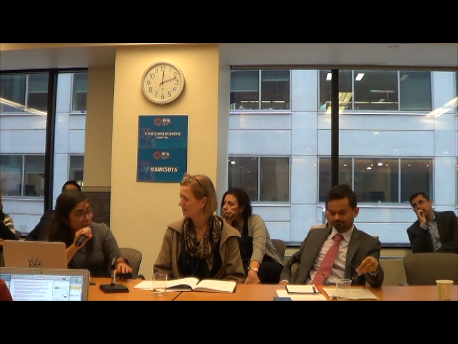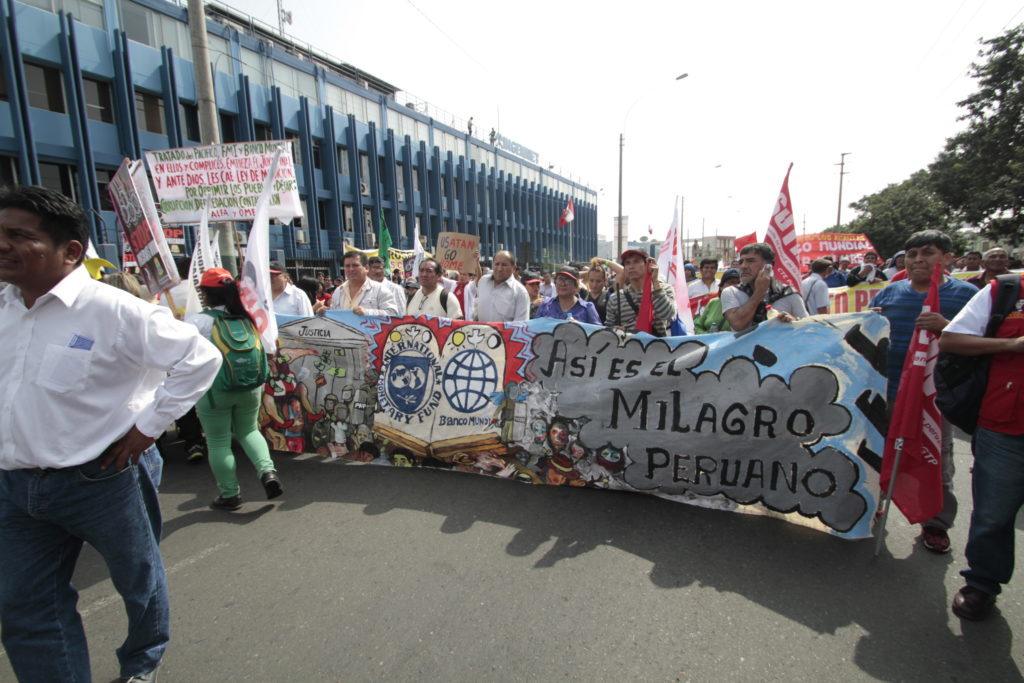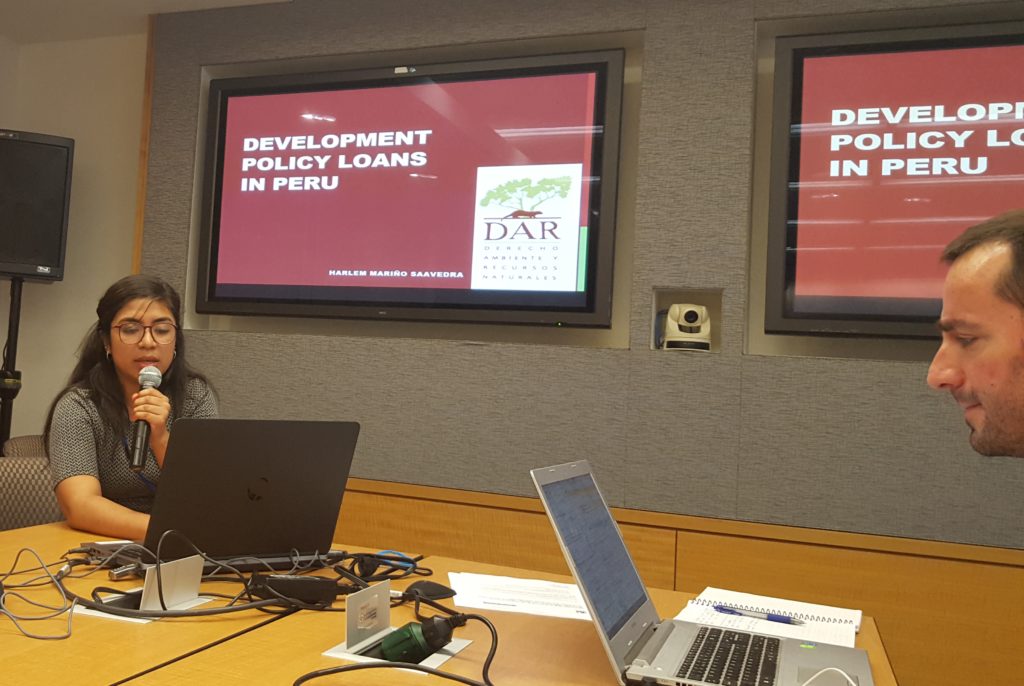-
DAR was invited to the World Bank / International Monetary Fund Annual Meetings as a speaker to comment on the effects of Development Policy Loans in Peru’s environmental management.
-
An analysis about the connection between the approval of laws that promote investments by weakening environmental regulations (Law N°30230) and Peru’s PPP regulatory framework.
-
The event “Development Policy Financing: Opportunities for Low-Carbon, Pro-Poor Outcomes” was moderated by Korinna Horta from Urgewald and the panelist were Heike Mainhardt from the Bank Information Center (BIC) and Hassan Zaman from the World Bank Operations Policy and Country Services.
-
The study “World Bank Development Policy Finance and Climate Change: Is the Bank providing the Right Incentives for Low-Carbon Development in Peru?” realized by the BIC, was presented at the event.
The Development Policy Loans (DPL) are financial instruments used by the World Bank that are delivered to countries in the context of its Country Assistance Strategy under the following conditions: a) maintenance of an adequate macroeconomic policy framework, as determined by the Bank with inputs from IMF assessments; (b) satisfactory implementation of the overall reform program; and (c) completion of a set of critical mutually agreed prior policy and institutional actions (prior actions) between the Bank and the client[1].
Harlem Mariño, one of DAR’s specialist, brought into discussion two of these DPLs and their effects on Peru’s socioenvironmental regulatory framework. The first one, meant to “boost human capital and productivity[2]” demanded as a prior action to sanction and eliminate in fast-track procedures any “rules, procedures, and illegal fees that are government by public bodies at any government level[3]”. This had as a direct consequence the weakening of the Peruvian Environmental Regulatory Agency’s[4] capacity to prevent and sanction environmental infractions by promoting the approval of Law N° 30230[5].
In this regard, she pointed out that the main problem is the little willingness shown by the Bank to develop an adequate monitoring system to assess the social and environmental risks of their own DPLs. The evidence of the impact of this law is the reduced capacity of the Peruvian authorities to properly respond to the oil spills in the Northern Pipeline.
 The WB response was poor. It didn’t consider the existence of a connection between direct and indirect incentives that were generated in this regard, pointing out they support policies and not specific projects. Furthermore, a similar situation occurs with the second DPL. This one aims to promote an improvement of the legal framework which regulates Public Private Partnerships (PPP) with the intention of accelerating the approval of projects needed for the country’s development. It’s important to remember that from 2011 to 2014 15 billion USD were lent to finance PPPs in Peru. 45% of this amount went to energy projects. In this regard, having a good environmental assessment from the WB would have enabled to notice that Peru doesn’t have a good regulatory framework for renewable energies and that a DPL to promote PPP in this conditions is to promote hydroelectric dams and hydrocarbon projects in the amazon forest; two activities that go against the efforts of the WB to fight climate change[6].
The WB response was poor. It didn’t consider the existence of a connection between direct and indirect incentives that were generated in this regard, pointing out they support policies and not specific projects. Furthermore, a similar situation occurs with the second DPL. This one aims to promote an improvement of the legal framework which regulates Public Private Partnerships (PPP) with the intention of accelerating the approval of projects needed for the country’s development. It’s important to remember that from 2011 to 2014 15 billion USD were lent to finance PPPs in Peru. 45% of this amount went to energy projects. In this regard, having a good environmental assessment from the WB would have enabled to notice that Peru doesn’t have a good regulatory framework for renewable energies and that a DPL to promote PPP in this conditions is to promote hydroelectric dams and hydrocarbon projects in the amazon forest; two activities that go against the efforts of the WB to fight climate change[6].
The Southern Peruvian Pipeline is an emblematic case to analyze. This PPP came with a minimum revenue guarantee or MRG. In fact, this minimum wasn´t achieved and according to BIC’s estimations, a 430 million USD total subsidy had to be paid by the users to the partner private companies.
 Last year the Word Bank / International Monetary Fund Annual Meetings were held in Lima. At the same time one of the biggest public demonstrations in recent years took place. The protest called “Debunking the Peruvian Miracle” convened workers unions, indigenous organizations, youth movements, among many others. This ended with the delivery of a statement to the leadership of both financial institutions that emphasized, among other important points, the Bank´s responsibility in the weakening process of Peru’s social and environmental standards.
Last year the Word Bank / International Monetary Fund Annual Meetings were held in Lima. At the same time one of the biggest public demonstrations in recent years took place. The protest called “Debunking the Peruvian Miracle” convened workers unions, indigenous organizations, youth movements, among many others. This ended with the delivery of a statement to the leadership of both financial institutions that emphasized, among other important points, the Bank´s responsibility in the weakening process of Peru’s social and environmental standards.
DAR and other civil society organizations considers that if DPLs are going to fulfill its objectives and will not have undesired impacts, these have to have measuring instruments for the socio-environmental risks; without this, the Bank’s goal to get Peru into the club of countries that have achieved an equilibrium between investment promotion and environmental sustainability will not be achieved.
[1] http://siteresources.worldbank.org/PROJECTS/Resources/40940-1244732625424/Q&Adplrev.pdf
[2] DPL1: Boosting human capital and productivity development policy financing with a deferred drawdown option: $1.25 billion USD.
[3] Prior action #6: Law 30230 of 2014 supported by this operation substantially expanded the set of bureaucratic barriers that INDECOPI can directly sanction in fast-track procedures to include any rules, procedures, and illegal fees that are governed by public bodies at any government level.
[4] Agency for Environmental Assessment and Enforcement, OEFA in Spanish
[5] “Law that stablishes tax measures, simplifies procedures, and permits for the promotion and revitalization of investments in the country”
[6] “For the World Bank Group, with its goals of ending extreme poverty and boosting shared prosperity, climate change and poverty are inextricably linked. A Bank report, Shock Waves: Managing the Impact of Climate Change on Poverty, warned that without rapid action, climate change could push an additional 100 million people into poverty by 2030”. Source: www.worldbank.org/en/topic/climatechange/overview


